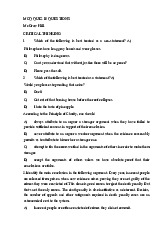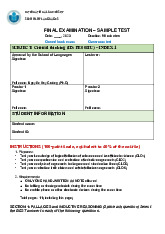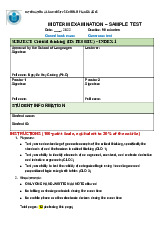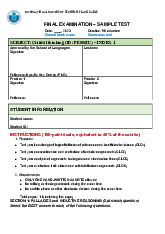

































Preview text:
lOMoARcPSD|359 747 69 9/10/2020 1 1 lOMoARcPSD|359 747 69 9/10/2020 3 2 lOMoARcPSD|359 747 69 9/10/2020 What is thinking? Bush-turkeys can’t fly: A: How do you know it?
D: Because it is a convincing argument. In order
to fly, birds need to be aerodynamic. Bush-
turkeys aren’t aerodynamic. Therefore, bush- turkeys can’t fly.
We need to seek evidence, build up arguments
to convince others. critical thinking What is thinking? Bush-turkey can’t fly: A: How do you know it? D: I just know! D: I believe it. D: I am right! D: I just do!
We just see and remember phenomena but
rarely think, ask ourselves “why?” and seek answers. 4 5 3 lOMoARcPSD|359 747 69 9/10/2020 6 7 Why does IU have this course? 4 lOMoARcPSD|359 747 69 9/10/2020 What is thinking?
Are we thinking when/by watching this video? No
Critical thinking = philosophical thinking = thinking about thinking. Analyze thinking Evaluate thinking To help you improve your Thinking Skills HOW TO THINK! 8 5 lOMoARcPSD|359 747 69 9/10/2020 9 What is Critical Thinking?
Critical thinking is the general term given to a wide range
of cognitive skills and intellectual dispositions needed:
to effectively identify, analyze, and evaluate arguments and truth claims,
to discover and overcome personal prejudices and biases,
to formulate and present convincing reasons in support of conclusions; and
to make reasonable, intelligent decisions about what to believe and what to do.
Cognitive, intellectual : thuộc về nhận thức, trí óc. Prejudice: ịnh kiến an unfair and unreasonable
opinion or feeling, especially when formed without enough thought or knowledge. Bias: thành kiến
often supporting or opposing a particular person or thing in an unfair way by allowing personal opinions to influence your judgment 10 6 lOMoARcPSD|359 747 69 9/10/2020 11 7 lOMoARcPSD|359 747 69 9/10/2020 1. Clarity
Clarity is a gateway standard. If a statement is unclear, we
cannot determine whether it is accurate or relevant.
In fact we cannot tell anything about it because we do not yet know what it is saying.
Clarity in expression is a sign of intelligence
Exploratory questions related to the Clarity Standard: Is my thinking clear?
Do I need to elaborate my thinking more?
Do I need to provide an illustration of what I mean?
Do I need to give an example from everyday life?
Clarity is the gateway standard 12 13 8 lOMoARcPSD|359 747 69 9/10/2020 Example of Clarity
Europe has a set of primary interests, which to us have
none, or a very remote relation. – Hence, she must be
engaged in frequent controversies, the causes of which
are essentially foreign to our concerns. – Hence,
therefore, it must be unwise in us to implicate
ourselves, by artificial ties in the ordinary vicissitudes of
her politics, or the ordinary combinations and collisions
of her friendships or enmities. (George Washington, “Farewell Address,” 1796) Example of Clarity
“Tóm lại, ây là bài học cho những nhà trí thức khi
nhận ịnh, phát biểu về một tôn giáo mà cứ ngỡ
mình ã nắm vững. Nhất là Phật giáo, không ơn
thuần như những tôn giáo khác, lại là Phật giáo Bắc
truyền quá a dạng và dung thông, hàm tàng nhiều
triết thuyết vi diệu.” (Minh Mẫn, PGVN, 05/09/2016) 14 9 lOMoARcPSD|359 747 69 9/10/2020 15 Example of Clarity
Europe has a set of vital interests that are of little or no
concern to us. For this reason, European nations will
often become embroiled in conflicts for reasons that
don’t concern us. Therefore, we shouldn’t form
artificial ties that would get us involved in the ordinary ups and downs of European politics. 16 10 lOMoARcPSD|359 747 69 9/10/2020 2. Accuracy
A statement can be clear, but not accurate as in:
“Most chickens weight over 300 pounds in weight.”
Questions related to evaluating the accuracy of thinking include: Is my thinking accurate?
How could I check to see if this is true?
How could I find out if this is correct?
How can I verify for accuracy? 17 CTS – Accuracy Is that really true? How could we check that?
How could we find out if that is true?
A statement can be clear but not accurate 11 lOMoARcPSD|359 747 69 9/10/2020 2. Precision
Precision - A statement can be both clear and accurate, but not precise.
Example: “Yao Ming is tall.” How tall? Very tall? 2m tall?
Questions useful in assessing precision:
Is my thinking as precise as it needs to be?
Do I need to be more specific?
Do I need to give more detail? Do I need to be more exact? How? 18 19 12 lOMoARcPSD|359 747 69 9/10/2020 Precision- example
A famous VN singer, Mỹ Linh caused an online quarrel years
ago by claiming: “If you want it to be cheap, do not ask for clean foods”.
Facebookers insisted that she look down other people (the poor, the peasants).
• Cheap = not precise (how much is cheap? 20.000 VND/kg or 200 VND/kg?)
• Clean foods = what? Meat, fish or vegetables?
• Clean = how clean it is? GAP (well-controlled)? Organic?
• GAP food is not expensive at all. 20 21 13 lOMoARcPSD|359 747 69 9/10/2020 4. Relevance
A statement can be clear, accurate, and precise, but not be relevant to the issue.
A favorite debaters’ trick is to try to distract an
audience’s attention by raising an irrelevant issue Questioning the relevance:
Is my thinking relevant to the issue?
How does that relate to the question at hand?
How does this information bear upon the problem I am concerned with?
How does this information help me deal effectively with the issue? 22 semester, therefore I 23 14 lOMoARcPSD|359 747 69 9/10/2020
6. Breadth (rộng, bao quát)
The ability to recognize all sides of an issue: broad view or thinking
Questions useful for examining breadth:
Am I looking at this issue in a narrow minded way?
Do I need to look at this from another perspective?
Do I need to consider another point of view?
Do I need to look at this situation in other ways?
5. Depth (sâu sắc, có chiều sâu)
We rightly prefer deep and complete thinking to
shallow (nông cạn) and superficial (hời hợt) thinking.
Questions useful for evaluating depth of our critical thinking:
What factors make up this difficult problem?
What are the complexities of this issue?
What are the difficulties I need to deal with?
Is my thinking taking into account the different
perspectives I need to consider? 24 15 lOMoARcPSD|359 747 69 9/10/2020 25
6. Breadth (rộng, bao quát)
What would this look like from the point of view of the student?
A line of reasoning may be clear, accurate, precise,
relevant, and deep, but lack breadth. 26 16 lOMoARcPSD|359 747 69 9/10/2020 7. Logical correctness
When we think, we bring a variety of thoughts together in
some order. When the combination of thoughts is mutually
supporting and makes sense in combination, the thinking is “logical.” Questions: Does this really make sense?
Does that follow from what you said? How does that follow?
But before you implied this and now you are saying that; how can both be true? 27 7. Logical correctness
Bertrand Russell, in his classic essay “An Outline of Intellectual
Rubbish,” provides an amusing example:
I am sometimes shocked by the blasphemies of those who
think themselves pious—for instance, the nuns who never
take a bath without wearing a bathrobe all the time. When
asked why, since no man can see them, they reply: “Oh, but you forget the good God.” 17 lOMoARcPSD|359 747 69 9/10/2020 28 29 18 lOMoARcPSD|359 747 69 9/10/2020 Consistency Example:
MM: Key, Yogi, what do you say we eat at Toots’ tonight?
Yogi: Nobody goes there anymore. It’s too crowded. Example:
I'm all for equal rights for women. I just think a woman's place is in the home.
9. Consistency (nhất quán)
A person holds inconsistent beliefs, at least one of those beliefs must be false. 2 kinds of inconsistency:
- Logical inconsistency: involves saying or
believing inconsistent things (i.e. things that
cannot both or all be true) about a particular matter.
- Practical inconsistency: saying one thing and doing another 30 19 lOMoARcPSD|359 747 69 9/10/2020 31 Good Thinking is…
CLEAR……….....rather than........UNCLEAR
ACCURATE…....rather than…….INACCURATE
PRECISE……....rather than…….VAGUE
RELEVANT…….rather than…….IRELEVANT
CONSISTENT….rather than……INCONSISTENT
LOGICAL……….rather than……ILLOGICAL
COMPLETE……rather than……INCOMPLETE
FAIR…………….rather than…....BIASED 32 20 lOMoARcPSD|359 747 69 9/10/2020 33
Benefits of Critical Thinking Academic Performance
understand the arguments and beliefs of others
Critically evaluating those arguments and beliefs
Develop and defend one's own well-supported arguments and beliefs. Workplace
Helps us to reflect and get a deeper understanding of our own and others’ decisions
Encourage open-mindedness to change
Aid us in being more analytical in solving problems 21 lOMoARcPSD|359 747 69 9/10/2020
Benefits of Critical Thinking Daily life
Helps us to avoid making foolish personal decisions.
Promotes an informed and concerned citizenry capable of
making good decisions on important social, political and economic issues.
Aids in the development of autonomous thinkers capable of
examining their assumptions, dogmas: giáo iều, and prejudices. 34 35 22 lOMoARcPSD|359 747 69 9/10/2020
Barriers to Critical Thinking
If Critical Thinking is so important, why is it that
uncritical thinking is so common?
Why is that so many people including many highly
educated and intelligent people find critical thinking so difficult? 36 23 lOMoARcPSD|359 747 69 9/10/2020 37
Barriers to critical thinking 1.
Lack of relevant background information 2. Poor reading skills 3. Bias 4. Prejudice 5. Superstition 6. Peer pressure 7. Face-saving 8. Resistance to change 9. Selective perception 10. Rationalization 11. Scapegoating 38 24 lOMoARcPSD|359 747 69 9/10/2020 Barriers to Critical Thinking
Five Powerful Barriers to Critical Thinking: Self-centered thinking self-interested thinking self-serving bias i Group-centered thinking Group bias Conformism (tâm lý bầy àn) i i
Beliefs that are presumed to be true without
adequate evidence or justification Assumption (giả ịnh) i Stereotyping (rập khuôn)
Believing that something is true because one wishes it were true.
The truth is “just a matter of opinion” l i i i
Relativism (chủ nghĩa tư ng ối) i i
Subjectivism (chủ quan chủ nghĩa) Cultural relativism (tư ng ối văn hoá) 39 25 lOMoARcPSD|359 747 69 9/10/2020 Self-interested thinking
• Almost no one is immune to self-interested thinking.
• Most doctors support legislation making it more
difficult for them to be sued for malpractice; most lawyers do not.
• Most factory workers support laws requiring advance notice
of plant closings; most factory owners do not.
• From a psychological standpoint, however, it is likely that
self-interest plays at least some role in shaping the
respective attitudes and beliefs. Barriers to Critical Thinking
EGOCENTRISM – the tendency to view one’s
own interests, ideas and values as superior to everyone’s else SELF-INTERESTED THINKING – SELF-SERVING
tendency to accept and defend beliefs BIAS – tendency to
that harmonize one’s own self-interest overrate oneself Tendency: khuynh hướng 40 26 lOMoARcPSD|359 747 69 9/10/2020 41 Self-serving bias
• Self-serving bias is the tendency to overrate oneself—to
see oneself as better in some respect than one actually is.
• If you are like most people, you probably think of
yourself as being an unusually self-aware person. If so,
then you too are probably suffering from selfserving bias.
Ex: Drunkers always said: “I am never drunk.” 42 27 lOMoARcPSD|359 747 69 9/10/2020
Barriers to Critical Thinking
Sociocentrism: group-centred thinking
Group bias – the tendency to see one’s own group as
being inherently better than others
(ex: fellow-countrymen club, association)
Herd instinct (conformism) – the tendency to
follow the crowd (tâm lý bầy àn, a dua) 43 28 lOMoARcPSD|359 747 69 9/10/2020
Barriers to Critical Thinking
Unwarranted Assumptions & Stereotyping
Assumption – something taken for granted,
something we believe to be true without any proof or conclusive evidence
Unwarranted assumption – something taken for granted without good reason
Most common form is stereotyping (rập khuôn, qu
ũa cả nắm)– making a hasty
generalization : “All Muslim are terrorist.” 44 29 lOMoARcPSD|359 747 69 9/10/2020
Barriers to Critical Thinking
Wishful thinking (mơ tưởng)
Believing something not because you had good
evidence for it but simply because you wished it were true.
Believing something because it makes one feel
good, not because there is good rational grounds for thinking it is true. 45
Barriers to Critical Thinking Relativistic thinking
Relativism is the view that truth is a matter of opinion.
There are two popular forms of relativism: subjectivism and cultural relativism.
Subjectivism is the view that truth is a matter of individual
opinion. (Mày khổ là do mày, ời chẳng có gì úng, sai, tốt, xấu cả, lăn tăn làm gì!)
Cultural relativism is the view that truth is a matter of social or cultural opinion.
The most common form of relativism is moral relativism. 46 30 lOMoARcPSD|359 747 69 9/10/2020
Barriers to Critical Thinking
Relativistic thinking - moral relativism.
Moral subjectivism is the view that what is morally
right and good for A (individual), is whatever A
believes is morally right and good.
Cultural moral relativism is the view that what is
morally right and good for A (an individual), is
whatever A’s society or culture believes is morally right and good. 47
Barriers to Critical Thinking
Several serious problems with cultural moral relativism
1. Relativism makes it impossible for us to criticize other
cultures’ customs and values, even those that
intuitively seem to us to be terribly wrong.
2. Relativism makes it impossible for us to criticize our
own societies’ customs and values.
3. Relativism rules out the idea of moral progress. 31 lOMoARcPSD|359 747 69 9/10/2020
Barriers to Critical Thinking Cướp lộc hội
ền Gióng là 'cướp có văn hóa' 03/03/2015 19:11 GMT+7
- Nhiều người nghĩ là cướp giật, nhưng không phải,
nó cũng giống tục cướp vợ của người H'Mông. Đây là
"cướp" có văn hóa, "cướp" trong tục lệ - Phó Ban Tuyên
giáo Thành ủy HN lý giải. 48 49 32 lOMoARcPSD|359 747 69 9/10/2020
Why standards of critical thinking are
important to overcome the barriers of critical thinking? 50 51 33 lOMoARcPSD|359 747 69 9/10/2020 Reference
http://www.criticalthinking.org
http://www.youtube.com/watch?v=gNCOO UK- bMQ
http://www.criticalthinking.org/CTmodel/CT Model1.cfm
http://www.teachertube.com/v.php?viewkey= 8caaadb505ab52c68278 52 34




